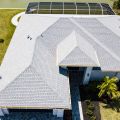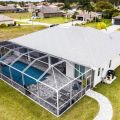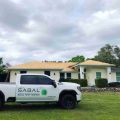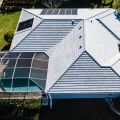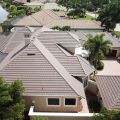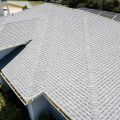Does Home Insurance Cover Roof Replacement in Florida?

Roof insurance: What you need to know?
If you have a standard homeowners insurance policy for all sorts of hazards, that's a piece of good news for you. Homeowners get reimbursed for roof replacement and restoration expenses. However, policyholders only get covered if the damage or destruction was provoked by a sudden calamity. Learn more about the roof insurance policy below.
What kind of roof damage is covered by insurance?
Roof damage is classified into two types from the perspective of insurance companies: damage from a covered casualty or wear and tear. If your roof has a leak or destruction due to covered losses like the rain, a falling tree branch, wind, or fire, the insurance firm will generally interfere and pay for the restoration or replacement according to your coverage limits.
If your roofing at home has a leak that is not caused by a natural disaster induced by the failure of the building structure, absence of maintenance, or the roof’s older age, an insurance company will probably not refund the cost to fix the damage or replace the roof. This is where the importance of a well-maintained roof comes in. A failing roof can be costly and most assumably will not be covered or refunded by home insurance.
Call Sabal Construction & Roofing, LLC at 888-591-8559 for a free roof inspection today!
How the age of your roof affects what's covered by insurance?
Insurance companies also require documents and other proof concerning the age of the roof. When your roof is old and tattered, it can make it more difficult to file roof damage covered by homeowners insurance.
For example, if a roof becomes so old and worn out, it becomes leaky. The homeowner's insurance company may actually decline to resume the policy until the homeowner restores the roof.
The main explanation why old roofs yield such a problem for insurance companies is because their age drives them to be more prone to damage that may not be hasty or unexpected. It’s likely a situation that was current and not handled by the homeowner directed every homeowner that wasn't maintained, no one would regard the necessity to replace their own roof, and that financial responsibility would be in the hands of insurance companies when it didn’t ought to.
Will homeowners insurance replace my roof if it’s damaged by a hurricane?
Standard policies, usually documented as HO-3 policies, commonly cover damage driven by occurrences like fire or lightning, windstorms or hail, explosions, riots of civil unrest, damage caused by an aircraft, damage caused by vehicles, smoke, vandalism or malicious mischief, theft, volcanic eruption, falling objects, or weight from ice.
If the roof was impaired as the result of any of these covered threats, the roof would most presumably be covered under the homeowner's insurance policy. That implies that common incidents such as a tree falling during a hurricane is generally covered by insurance because the damage came from a covered peril, which in this case was the windstorm.
When is roof replacement not covered by insurance?
1. If your insurance company considers the damage to be cosmetic, repair or replacement likely won’t be covered.
Another point to remember is that the damage from the peril has to be major enough to cause issues with the roof’s structure or function. If the damage to the roof is deemed cosmetic, the homeowner may not be reimbursed by homeowners insurance for their roof insurance claim.
2. Preventable damage is usually not covered, including pest damage and general wear and tear.
Homeowners often ask if homeowners insurance cover roof leaks. It likely won’t, relying on what compelled the leak. Pest damage is certainly not covered by homeowners insurance, because it’s deemed preventable and part of the routine maintenance a homeowner should be performing. Getting ahead of the problem means not having a situation where extensive damage means expensive repairs.
3. Your homeowner's insurance policy excludes certain perils where roof replacement won’t be covered.
The best homeowners insurance policies cover only certain perils. Coverage for other perils may demand you to pay for additional homeowners insurance; two instances are earthquakes and flooding. It would have to be a very major flooding circumstance to damage the roof of a home or establishment, but these events do happen.
How to get insurance to pay for roof replacement?
To give yourself the best chance of having your insurance company pay for a roof repair or replacement, the first phase is to do is have them inspect your roof. Prepare as many documents as you can, including a record of your existing home insurance policy, home inspection reports (if there are any), receipts for any restoration works done, and photos of damages that have transpired. The before-and-after shots are ever beneficial, it's a fair idea to save photos of your roof when it looks wholesome. These will be valuable in the claims procedure. The insurance company will dispatch an adjuster to examine the damage and submit their own inspection reports.
How to protect your roof from damage?
It is the job of the homeowner to habitually clean and maintains their roof, and to be mindful of the life span of various materials, which normally last from 15 to 100 years. Homeowners can carry out other steps to safeguard their roof—like hiring certified roofing professionals to conduct routine inspections. A lot of roofing businesses like Sabal Construction and Roofing examine a roof for free and give you feedback or documented reports of your roof's problems.
Ensure your roof is free of rubbish and does not keep water. Regularly trim tree branches that are touching your roof and always inspect your roof following a big storm or to see if the shingles and gutters are fine. If you reside in windy areas, make sure that your home and roof adhere to the present building codes.
Contact Cape Coral's Most Trusted Roofing Contractor
Sabal Construction and Roofing LLC, an experienced general contracting and roofing company, is family-owned and locally operated by a second-generation Floridian contractor. We are a State Certified General Contractor and fully insured company. We responsibly adhere to all job specifications, manufacturer requirements, and safety codes to provide premier service to our valued customers.
Services We Offer:
To discover more about roofing services, call Sabal Construction & Roofing LLC at 888-591-8559 or message us online today.


